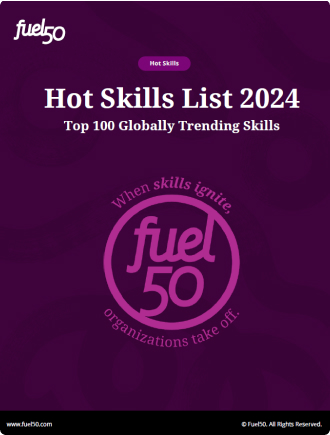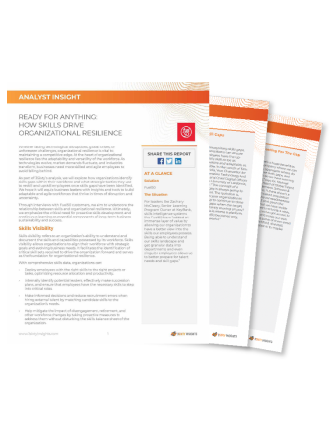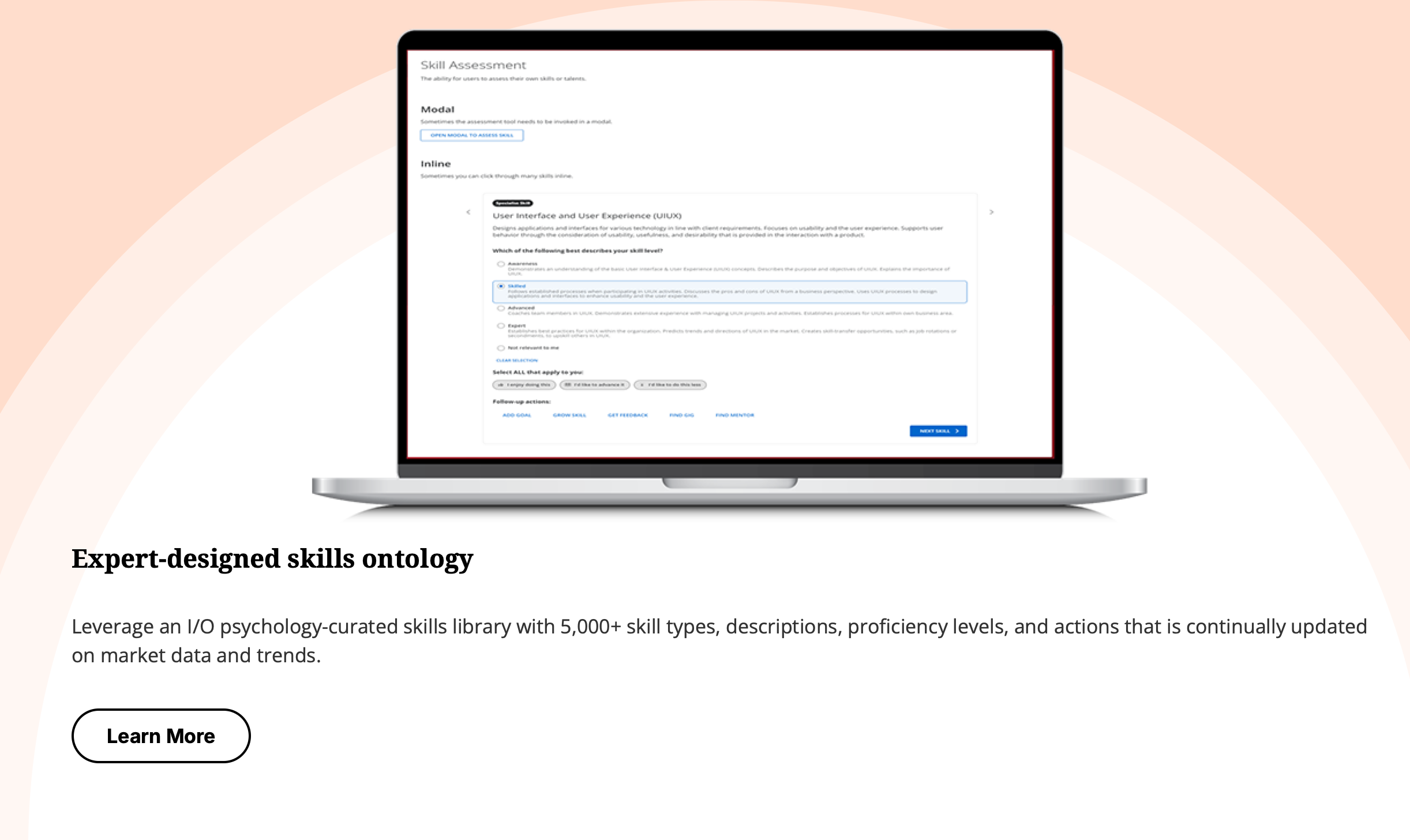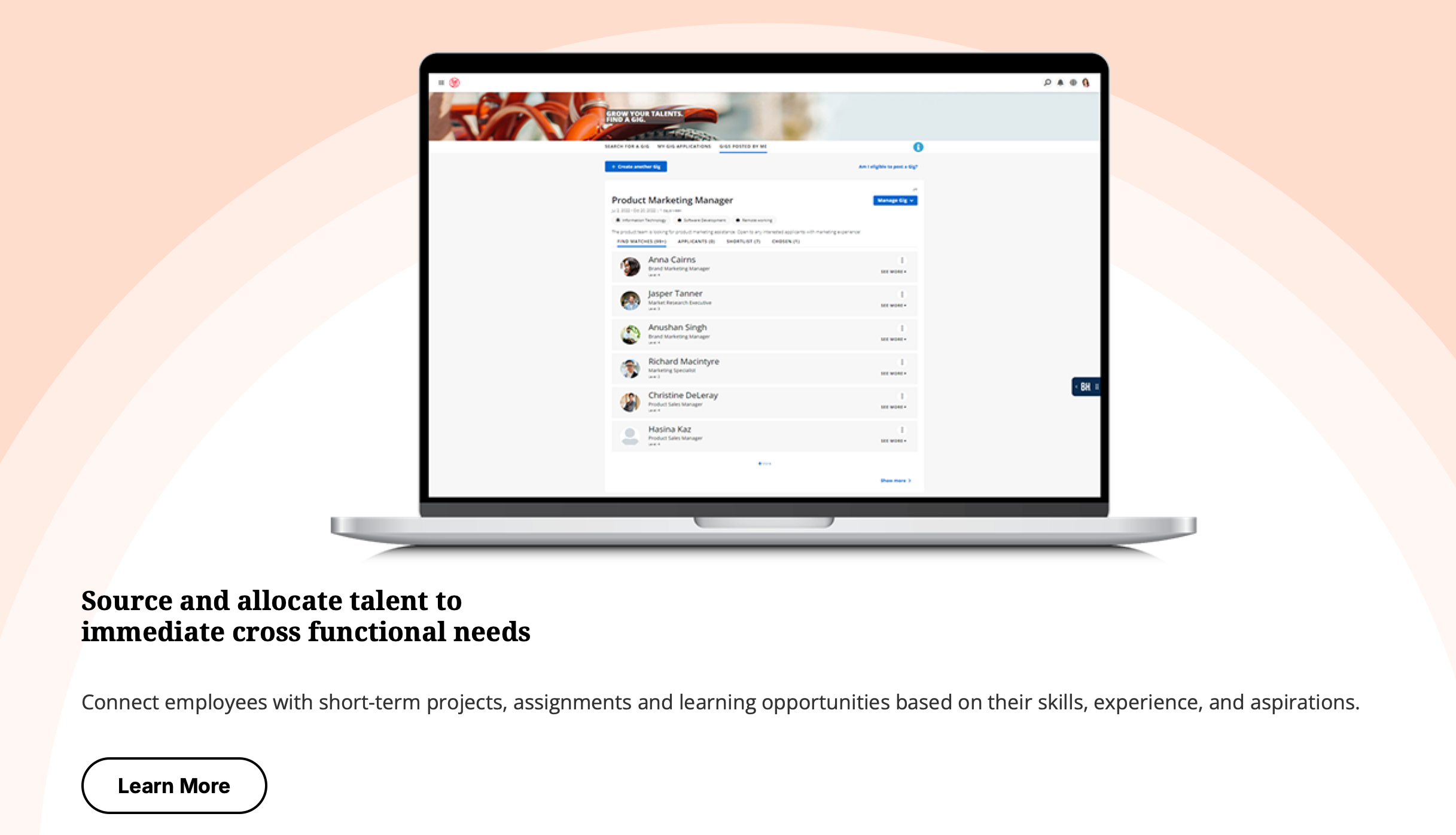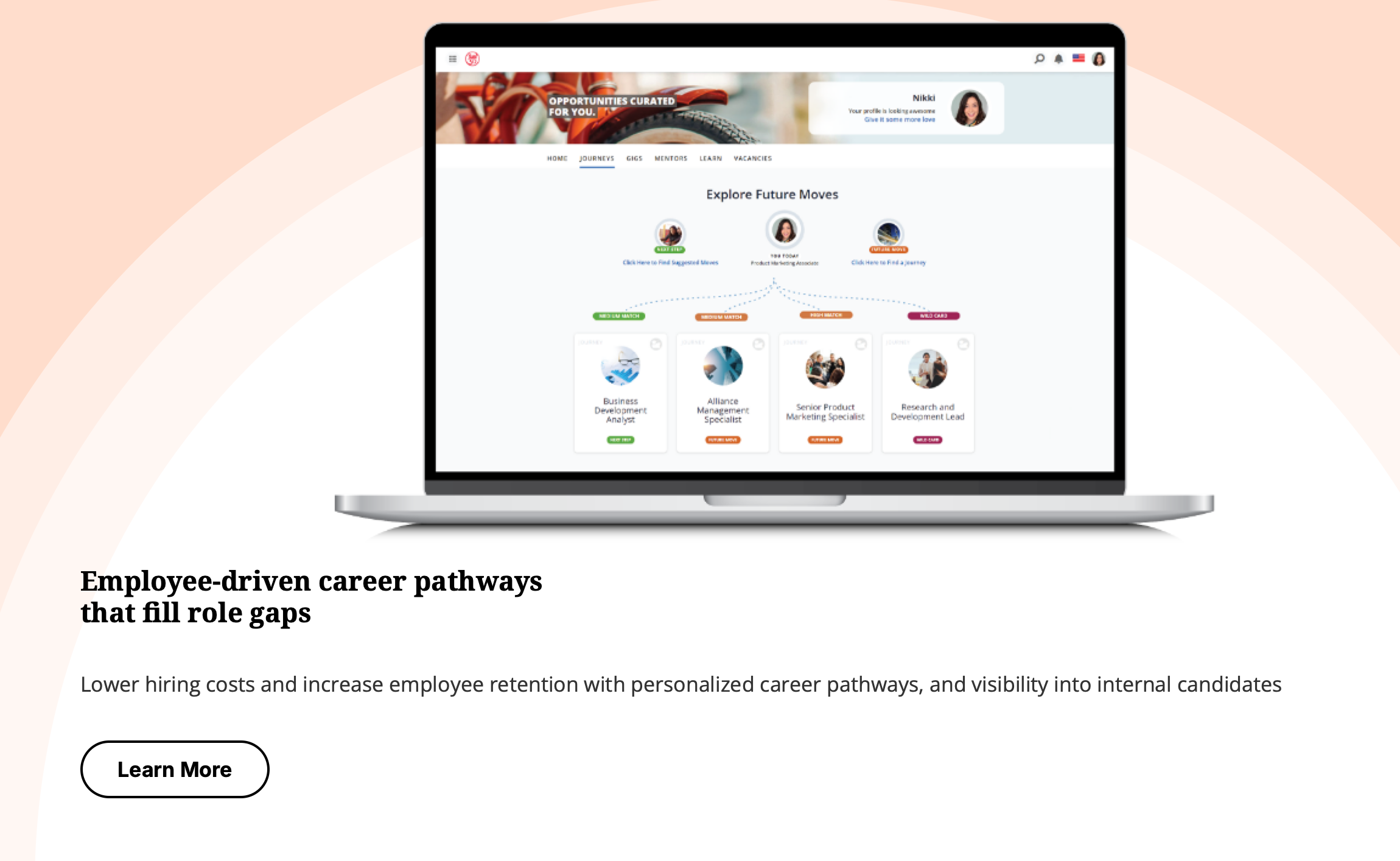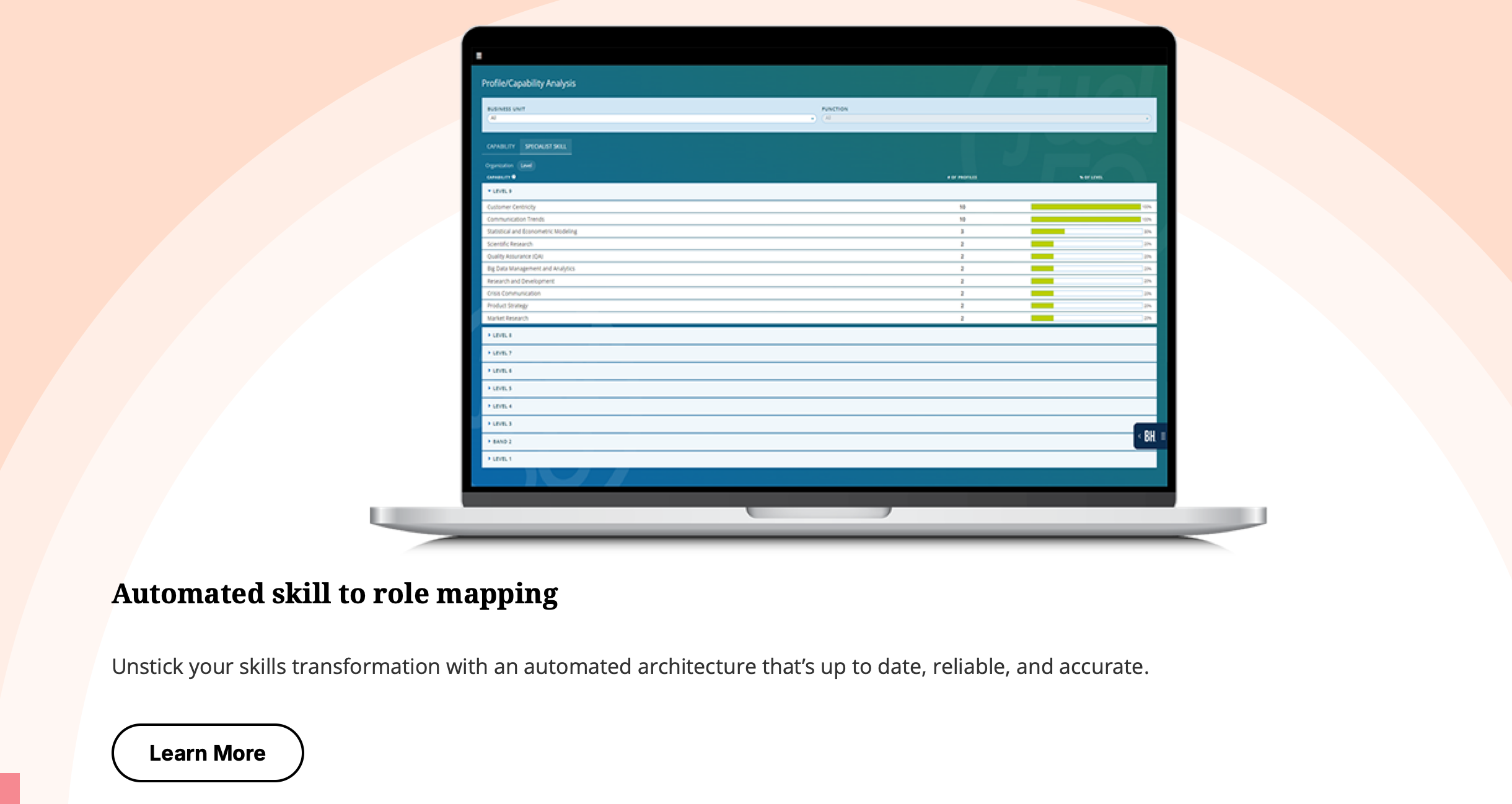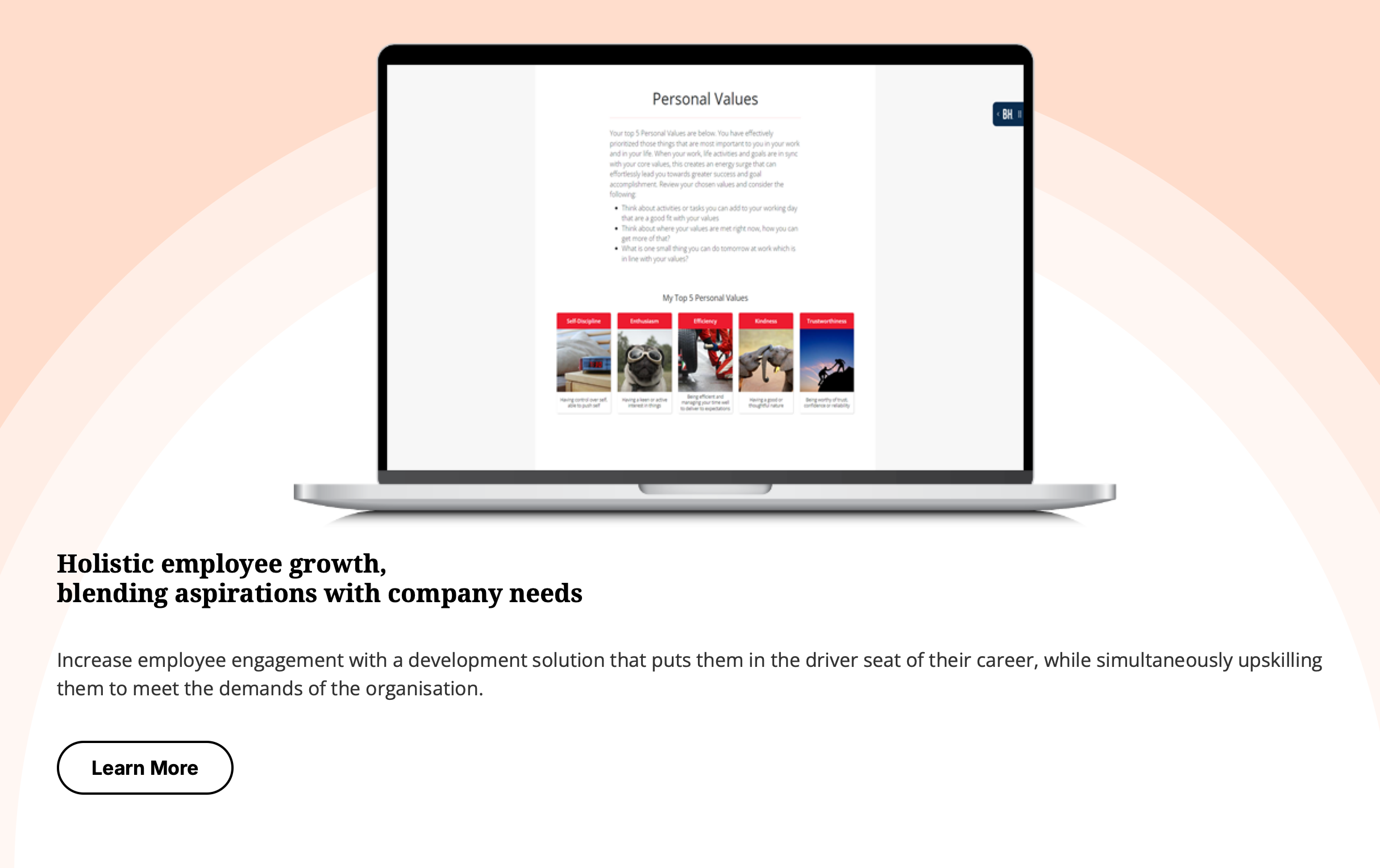As the world of work continues to evolve due to global and economic changes, it has become imperative for organizations to adopt an agile and adaptable approach to ways of working. This is where the need for skills-based organizations comes in – a more agile and employee-centric organization where employees are valued for their skills rather than their job title, level, or educational qualifications.
Mapping existing skills within the organization is a critical component of transitioning to a skills-based framework. Understanding employees’ current skills is essential for targeted training and development, bridging skill gaps effectively, and aligning individual competencies with organizational needs.
Shifting from a traditional job-based talent strategy to a skills-based strategy enables these organizations to respond to change quickly and more effectively, giving them a competitive advantage in today’s unpredictable environment.
What is a skills based organization?
A skills-based organization fundamentally reimagines how work gets done. Instead of organizing around rigid job titles and hierarchies, these organizations structure themselves around skills, capabilities, and outcomes. Think of it as the difference between a fixed org chart and a fluid talent ecosystem.
A skills taxonomy provides a structured framework for classifying and organizing skills, enhancing talent management and identifying skill gaps.
But what does this really mean in practice? A skills-based organization operates on three core principles:
Skills as currency, not jobs
Traditional organizations ask “What job does this person have?” Skills-based organizations ask “What capabilities can this person offer?”
This subtle shift has profound implications. Rather than being confined to predefined roles and traditional job descriptions, talent becomes fluid, moving to where their skills create the most value.
Unilever exemplifies this transformation. They’ve moved away from viewing roles as fixed job titles and instead see each position as a collection of skills that can be deployed flexibly across the organization. This allows them to rapidly assemble teams based on the specific skills needed for each initiative.
Work as outcomes, not tasks
In skills-based organizations, work is defined by outcomes to be achieved rather than tasks to be completed. This means moving from “Who’s responsible for this job?” to “What skills do we need to solve this challenge?”
Dynamic skills development
Unlike traditional organizations where skills development happens through formal training tied to job roles, skills-based organizations foster continuous learning through real work. They create environments where employees can constantly develop new capabilities by taking on diverse projects and challenges.
What truly sets skills-based organizations apart is how they make skills portable across the enterprise. Instead of skills being trapped within departmental silos, they can flow to where they’re needed most. For example, someone with strong data analytics skills in marketing might contribute to a finance project requiring those same capabilities.
However, becoming a skills-based organization isn’t simply about implementing new HR processes or technology. It requires a fundamental shift in mindset about how work gets done and how value is created. It’s about seeing your organization not as a collection of jobs to be filled, but as a dynamic marketplace of skills to be deployed.
This shift is becoming increasingly critical in today’s business environment, where the half-life of technical skills continues to shrink and the need for rapid adaptation grows. According to Deloitte’s research, 98% of business executives plan to incorporate more skills-based approaches in the future, recognizing that traditional job-based models simply can’t keep pace with the speed of change.
But perhaps most importantly, skills-based organizations don’t just benefit the business, they create more opportunities for employees. When work is organized around skills rather than jobs, people have more pathways for growth and development. They can apply their capabilities in new ways, develop adjacent skills, and chart more flexible career paths based on their interests and strengths.
Why organizations of the future are skills-based?
For decades, jobs have been at the core of how we define work – dictating how work is done and by whom, as well as how employees are supported and compensated.
According to Deloitte, having a primary focus on jobs “hinders some of today’s most critical organizational objectives: organizational agility, growth, and innovation; diversity, inclusion, and equity; and the ability to offer a positive workforce experience for people.”
To successfully navigate this and become future-proof, organizations must steer clear of traditional job structures and implement more modern ways of managing talent.
A skills-based strategy is a new model of work where employees are matched to tasks and projects based on their skills, capabilities, and interests as opposed to their job titles.
Further research by Deloitte indicates: organizations that take this approach achieve better business results than those with job-based practices as they are 98% more likely to retain high performers, 52% more likely to innovate, and 49% more likely to improve processes and maximize efficiency.
5 characteristics of a skills-based organization
Here are the traits of a skills based org:
A culture focused on skills
A skills-based organization sees capabilities, not job titles, as their fundamental building blocks. This isn’t just a structural choice, it’s a cultural transformation that changes how people think about their work and careers.
In practice, this means nurturing an environment where skills development is celebrated and rewarded. Managers don’t just ask “Did you complete your tasks?” but rather “What new capabilities did you develop?” This shift has profound implications for both employees and employers.
For employees, it means liberation from the constraints of job titles. Someone hired as a “Marketing Specialist” isn’t limited to marketing tasks – they can apply their analytical skills to finance projects or their creative capabilities to product development. For employers, this cultural shift unlocks hidden talent and enables more efficient resource allocation.
KeyBank demonstrates this cultural transformation in action. They’ve created a “Future Ready” initiative where employees are encouraged to develop skills beyond their current roles, resulting in 60% more internal mobility and significantly higher employee engagement.
A solid skills architecture
Modern skills-based organizations build sophisticated systems to track, measure, and deploy skills across their workforce. This isn’t just an HR database, it’s a living, breathing ecosystem that captures skills data in real-time and makes it actionable.
The importance of this infrastructure cannot be overstated. Without accurate, up-to-date skills data, organizations can’t effectively match talent to opportunities or identify critical skill gaps. Think of it as the central nervous system of a skills-based organization.
For employees, this transparency means better visibility into what skills are in demand and what they need to develop for future opportunities. For employers, it enables more precise workforce planning and development strategies.
Fluid work structures
Skills-based organizations break free from rigid departmental silos, instead creating flexible structures that allow skills to flow where they’re needed most. This might mean project-based teams that form and dissolve based on business needs, or internal talent marketplaces where employees can find opportunities across the organization.
For employees, fluid structures mean more diverse experiences and faster skill development. For employers, it means greater agility and better resource utilization.
Continuous learning integration
In skills-based organizations, learning isn’t a separate activity, it’s integrated into the flow of work. Rather than relying solely on formal training programs, these organizations create opportunities for employees to learn through real-world application of new skills.
This approach benefits employees by making skill development more practical and immediately applicable. For employers, it means faster skill acquisition and better return on learning investments. More importantly, it creates a workforce that’s constantly evolving and adapting to new challenges.
Data-driven skills valuation
Skills-based organizations develop sophisticated ways to value and reward skills based on market demand and organizational need, rather than just job level or tenure. This means creating transparent frameworks for how skills translate into compensation and career opportunities.
For employees, this creates clearer pathways to increase their value and earnings. According to Deloitte, 75% of workers say skills-based pay would be a positive development. For employers, it helps attract and retain critical talents while ensuring fair compensation based on actual capabilities rather than job titles.
This approach particularly shines in addressing pay equity issues. When compensation is tied to verifiable skills rather than negotiation ability or job history, organizations can make more objective and equitable pay decisions.
Why does your organization need a skills-based talent strategy?
A skills-based talent strategy offers compelling advantages that can transform how organizations develop, deploy, and retain talent.
Wider talent pools
The traditional approach of hiring based on job titles and years of experience artificially constrains your talent pool. By shifting to a skills-based strategy, organizations can tap into previously overlooked talent sources.
Consider this: When AT&T needed machine learning expertise, instead of looking for candidates with specific job titles, they analyzed the skill patterns of successful machine learning practitioners. This approach tripled their potential talent pool and allowed them to identify candidates with adjacent skills who could be quickly upskilled.
For HR leaders, this means:
- More candidates to choose from in a tight labor market
- Reduced time-to-fill for critical positions
- Lower recruitment costs
- Greater diversity in candidate pools
Enhanced career growth and learning opportunities
Skills-based organizations fundamentally reimagine career development. Instead of limiting employees to linear career ladders within their departments, they create dynamic opportunities for growth in multiple directions.
Aligning training and performance evaluations with skills facilitates targeted employee development and career progression.
At KeyBank, implementing a skills-based approach led to a 60% increase in internal mobility. Employees could discover and pursue opportunities based on their skills and interests rather than being confined by their current job titles. This resulted in:
- Higher employee engagement
- Improved retention rates
- More diverse career paths
- Accelerated skill development
Reduced bias in talent decisions
Traditional hiring and promotion decisions often suffer from unconscious biases related to educational background, previous job titles, or personal networks. A skills-based approach introduces objectivity by focusing on demonstrated capabilities.
Research from Deloitte shows that 80% of business executives believe skills-based hiring and promotion decisions reduce bias and improve fairness. This approach:
- Creates more equitable access to opportunities
- Improves diversity at all organizational levels
- Makes talent decisions more merit-based
- Reduces the impact of “pedigree bias”
Organizational agility
Perhaps the most compelling benefit of a skills-based strategy is how it enables organizational agility. In a world where business needs can change overnight, the ability to quickly redeploy talent becomes crucial.
When UCI implemented a skills-based talent marketplace, they achieved a 50% reduction in attrition and significantly improved their ability to respond to changing business needs. This agility manifests in several ways:
- Faster response to market changes
- More efficient resource allocation
- Reduced dependency on external hiring
- Better alignment between talent capabilities and business needs
Cost optimization
While often overlooked, a skills-based strategy can significantly impact an organization’s bottom line. By better utilizing internal talent and reducing dependency on external hiring, organizations can optimize their talent costs.
Research indicates that external hires typically cost 18-20% more than internal candidates for the same role, and they perform worse for the first two years. A skills-based approach helps organizations:
- Reduce recruitment costs
- Lower training expenses through targeted skill development
- Improve productivity through better skill deployment
- Decrease turnover-related costs
How to transform into a skills-based organization?
As HR professionals begin to realize the power of skills-based talent strategies, more organizations are embracing skills as the new way of managing talent to better support employees and drive business impact.
Here are 3 key steps to help you transition into a skills-based organization:
1. Implement a more flexible, agile workforce architecture
Shifting from a job-based mindset to a skills-based mindset requires a major re-evaluation of your career framework. Traditional job architectures are built with a focus on role descriptions that are categorized based on the qualifications and/or certifications required for each specific role.
The first step is to update your career framework to be skills-centric by reviewing all role descriptions and updating them with the skills needed for each role.
While this may seem like a huge undertaking, Fuel50’s talent marketplace and dedicated team of workforce architects make the process easier by supporting the modernization of your career framework and transforming hierarchical job architectures to a flatter and more agile organizational structure.
Once the process is complete, skills become the new focus within your organization, enabling you to match employee skills to internal opportunities, vacancies, and projects to promote workforce agility, cross-functional collaboration, and talent mobility.
2. Take a skills-based approach to talent development
Now that you have a modernized workforce architecture in place, you can strengthen your workforce with a skills-based approach to talent development.
The key here is to build skills transparency across your organization to allow employees to understand the skills they need now and in the future. A talent marketplace supports this by highlighting the skills you currently have within your organization and identifying the skills gaps that need to be filled.
Training and development plans can then be aligned accordingly to support the growth of employees as well as the needs of the organization.
A skills-based approach enhances talent development by:
- Creating visibility of the skills across the organization
- Highlighting skills gaps, allowing organizations to plan upskilling initiatives
- Creating a common organization-wide approach to skills and talent management
- Transforming talent strategies to include skills management strategies that enable upskilling and reskilling
3. Implement agile methodologies
Agile methodologies contribute to the success of skills-based organizations, so it is important to embrace core agile values across your organization. This includes prioritizing individuals and interactions over processes and tools and prioritizing responding to change over following a plan.
According to McKinsey Research, agile organizations cultivate a “people-centered culture and operate in rapid learning and fast decision cycles which are enabled by technology, and a common purpose that co-creates value for all stakeholders.”
Leaders must encourage these ideals by embracing change, facilitating collaboration, and advocating talent mobility.
Tips to ensure your transformation is successful
In addition to the key steps above it’s important to adopt a skills-based mindset throughout your organization. Deloitte highlights the following critical principles needed for a skills-based approach to be successful:
- Creating a common language of skills across the organization.
- Performance management needs to include skills application and development.
- Leveraging talent marketplaces that match skills to jobs, tasks, projects, gigs, and mentoring assignments.
- Learning and development programs should be designed on skills, not jobs.
- Adopt a skills-based approach to recruiting
- Design compensation policies based on skills.
- Include skills into succession planning.
- Leverage technology to help create visibility and keep track of skills development progress.
How Fuel50 can help You become a skills-based organization
While transforming into a skills-based organization can seem daunting, a skills-powered talent marketplace is a powerful tool that can support these changes and help ensure the transition is as seamless as possible.
As a result, your organization will build the agility it needs to keep up with the rapid changes we are facing today and in the future.
Here’s how Fuel50’s talent marketplace tool can help you:
Create a dynamic skills inventory with expert-driven skills ontology
At the heart of any skills-based transformation lies the need for a sophisticated understanding of skills. Fuel50’s advanced skills ontology transcends traditional taxonomies by providing a living, breathing ecosystem of over 5,000 unique capabilities, specialist skills, and tools.
This isn’t just another skills database – it’s a carefully curated framework developed by I/O psychology experts that grows and evolves with your organization.
What sets Fuel50’s skills ontology apart is its depth and practicality. Each skill comes with clear definitions and outcome-focused proficiency level descriptors, removing the ambiguity that often plagues skills assessment.
The system also includes suggested development actions for each skill, making it actionable for both employees and managers. Moreover, built-in bias checks ensure inclusivity and fairness, while continuous updates reflect emerging skills and market trends.
Enable data-driven skills insights
In the journey toward becoming a skills-based organization, visibility is crucial. Fuel50’s analytics capabilities provide unprecedented insights into your organization’s skills landscape.
This goes beyond simple skills mapping to offer real-time understanding of skills distribution, critical gaps, and future needs based on market trends.
CarTrawler’s experience illustrates the power of these insights. By leveraging Fuel50, they assessed over 2,800 skills across their organization, enabling them to make informed decisions about talent development and deployment. This level of visibility helped them transition from intuition-based to data-driven talent decisions.
Foster internal mobility through AI-powered matching
The true power of a skills-based organization lies in its ability to deploy talent flexibly. Fuel50’s talent marketplace uses sophisticated AI to connect skills to opportunities in ways that traditional job-based systems simply can’t match.
The system considers both current skills and growth potential, enabling cross-functional moves that might be overlooked in a traditional organizational structure.
UCI’s experience demonstrates the impact of this approach. After implementing Fuel50’s talent marketplace, they achieved a 50% reduction in attrition. This dramatic improvement came from giving employees visibility into opportunities they might never have discovered in a traditional job-based system.
Support skills-based career development
Transforming into a skills-based organization requires empowering employees to take charge of their own development.
Fuel50 makes this possible by providing comprehensive career development tools that focus on skills rather than traditional job ladders. The platform offers sophisticated skills assessments, visibility into in-demand skills, and customized learning recommendations.
KeyBank’s success story illustrates the power of this approach. They achieved a remarkable 72% user return rate on their Fuel50 platform, showing that employees actively engage with skills-based career development when given the right tools and support.
Enable skills-based workforce planning
Strategic workforce planning takes on new dimensions in a skills-based organization. Fuel50 provides leaders with powerful tools to understand their current skills landscape and plan for future needs.
The platform enables sophisticated skills gap analysis at both organizational and team levels, while predictive analytics help identify emerging skill needs before they become critical gaps.
This capability proved transformative for organizations like Allied Irish Banks, which used Fuel50 to achieve a 96% return user rate and significantly improve their ability to plan for future skill needs.
Facilitate cultural transformation
Perhaps most importantly, Fuel50 supports the cultural transformation required to become a skills-based organization.
This isn’t just about implementing new technology – it’s about changing how people think about work, careers, and development.
The platform provides comprehensive change management support, helping organizations communicate the value of skills-based approaches and demonstrate impact through meaningful metrics.
Texas Health Resources exemplifies this transformative journey. Through their CareerDrive portal powered by Fuel50, they achieved a 91% satisfaction rate, demonstrating how the right platform can drive widespread adoption of skills-based practices.
If you want to learn more about how Fuel50 can help you transform into a skills-based organization, request a demo here.



